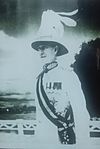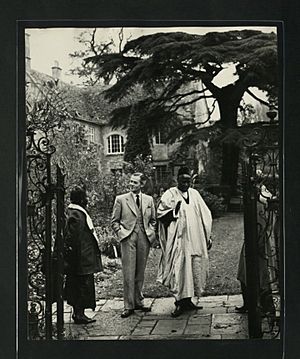Gawain Westray Bell facts for kids
Quick facts for kids
Sir Gawain Bell
|
|
|---|---|

Sir Gawain Bell
|
|
| Governor of Northern Nigeria | |
| In office 2 December 1957 – 1962 |
|
| Preceded by | Sir Bryan Sharwood-Smith |
| Succeeded by | Alhaji Sir Kashim Ibrahim |
| Personal details | |
| Born | 21 January 1909 Cape Town, South Africa |
| Died | 26 July 1995 (aged 86) |
Sir Gawain Westray Bell (21 January 1909 – 26 July 1995) was an important British administrator. He worked in many different countries. He is best known for becoming the Governor of Northern Nigeria.
Contents
Early Life and Education
Gawain Bell was born in Cape Town, South Africa. His father worked for a shipping company. When Gawain was 10, his family moved to Cumberland, England.
He went to several famous schools. These included the Dragon School and Winchester College. He also studied at Hertford College, Oxford.
Working in Sudan and Palestine
In 1931, Bell started working in Sudan. This was part of the Sudan Political Service. He learned to speak Arabic there. He worked in different areas of Sudan, including the Nuba Mountains.
In 1938, he moved to Palestine. He worked with the police in Gaza. He later led a special police group. This group was called the Beersheba Camel Gendarmerie.
World War II Service
Bell volunteered to serve in the Second World War. He rode horses with a special group of Druze cavalry. They helped capture a place called Suweida. This was from the Vichy French forces.
He became a leader in the Arab Legion. He received an award for his military service in 1942. In 1945, he married Silvia Cornwell-Clyne.
After the war, Bell returned to Khartoum, Sudan. He held important government roles there. He later became a British agent in Kuwait in 1955. This was during a time known as the Suez crisis.
Leading Northern Nigeria
In 1957, Bell was chosen for a big job. He became the Governor of Northern Nigeria. He worked closely with Sir Ahmadu Bello. Bello was a powerful leader in Sokoto.
Some British officials found Bello hard to work with. But Bell came with an open mind. He built a strong relationship with Bello. Bello even asked him to stay as governor. This was after Nigeria became independent from the United Kingdom. Bell left his role as governor in 1962.
Later Career and Retirement
After Nigeria, Bell worked on projects in the Middle East. He helped create a constitution for the Federation of South Arabia. He also worked in the Trucial States and Oman.
From 1966 to 1970, he worked in the Pacific. He was the last European Secretary-General. This was for the South Pacific Commission. Today, it is called the Secretariat of the Pacific Community.
Bell retired in 1970. He then focused on charity work. He was a leader for LEPRA. This charity helps people with leprosy. He also served on the board of the School of Oriental and African Studies. This is part of the University of London. He was also the first president of a society that studies Sudan.
He wrote two books about his life. The first, "Shadows on the Sand," covers his time in Sudan. The second, "An Imperial Twilight," talks about his years in Nigeria and Arabia.
Awards and Honors
Sir Gawain Bell received several awards for his service:
- Member of the Order of the British Empire (Military Division; 1942)
- Commander of the Order of the British Empire (1955)
- Knight Commander of the Order of St Michael and St George (1957)
- Knight of the Order of St John (1959)
 | Precious Adams |
 | Lauren Anderson |
 | Janet Collins |


